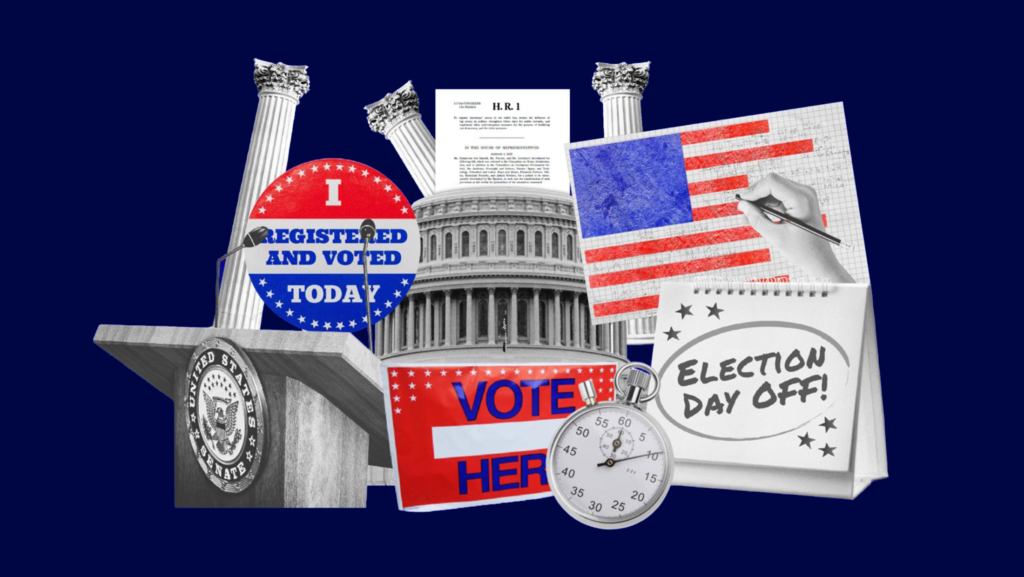The Voting Rights Reforms Experts Want to See

During the first 100 days of the Biden Administration, Democracy Docket highlighted a series of voting rights reforms that Democrats can and should champion to protect voters in 2022 and beyond.
With H.R. 1 and the John Lewis Voting Rights Advancement Act stalled in Congress, we asked our contributors to think beyond existing federal legislation and to share other new, bold, voter-centric policy ideas. The result: a thought coalition led by some of the foremost minds in the fight for voting rights. In the face of unprecedented voter suppression by the GOP, these reforms are dire. We’re proud to spotlight these proposals and hope they inspire you to take up the fight in rebuilding and strengthening our democracy.
Here are some of the voting rights reform ideas that Democracy Docket featured in the first 100 days of the new administration:
Marc Elias
Democracy Docket’s founder Marc Elias proposed several reforms in the first 100 days, including encouraging Congress to pass the “Thirty-Minute Limit”—a law that would require states to pay voters for time spent waiting in line to vote in excess of 30 minutes. He also called upon Congress, progressive legal organizations and judges to refine voting rights jurisprudence, specifically the need for abandoning the artificial “balance test” promoted by conservatives. Most recently, he asked corporate America to stand up against voter suppression, outlining five different steps businesses must take to defend democracy.
Nicholas Stephanopoulos
Harvard Law professor and election law expert Nicholas Stephanopoulos resurfaced a little-known congressional power: each chamber could establish rules for fair elections that ban gerrymandering and voter suppression, and refuse to seat any members that benefit from these practices. Congress has the final say over who is seated in their chamber — they should use it to protect the rights of voters.
Dale Ho
Director of the Voting Rights Project at the ACLU Dale Ho argued that Election Day Registration (EDR) would boost turnout by up to 10%, especially among groups of historically disenfranchised voters, and that blue states can lead the way by immediately establishing the policy.
David Litt
Obama speechwriter David Litt urged Democrats to abolish the filibuster. Republican priorities like tax cuts can be passed through reconciliation, but the ambitious voting rights legislation Democrats have proposed can not. Mitch McConnell will nix the filibuster as soon as it benefits him — Democrats should beat him to the punch.
Justin Levitt
Justin Levitt, former Deputy Assistant Attorney General in the Civil Rights Division of the U.S. Department of Justice, proposed a renewed focus on the fundamentals of our election system: adequate funding for election administrators, updated voting machines and poll worker recruitment.
Corley Kenna
Patagonia Director of Global Communications and Public Relations Corley Kenna urged other companies to step up and join the fight for our democracy, starting by giving their own employees time off to vote.
Muriel Bowser
Washington, D.C. Mayor Muriel Bowser made the case for statehood, which would be a historic restoration of voting rights for over 700,000 capital residents who currently have no representation in Congress.
Leading Democratic Pollsters
Five of the leading polling and data firms diagnosed the two main problems with the 2020 polls: turnout and measurement error. Ahead of 2022, they suggest many options to better the polling industry. That means thinking about doing door to door polling, recruiting people to participate in research using paid incentives and continuing to develop multi-modal research tools.
These leaders’ contributions to the voting rights agenda paint a picture of a brighter, more just future for our country and our elections. Democracy Docket is proud to share these proposals and we look forward to continuing the discussion. Onward!